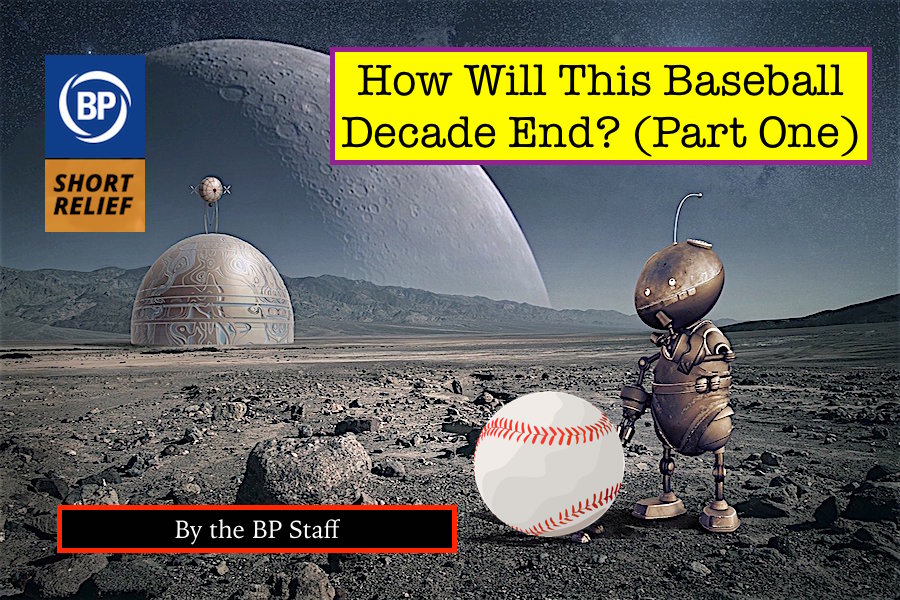
The first pitch of the first game of the 2010 Major League Baseball season was thrown by Josh Beckett of the Boston Red Sox. It was hit by Derek Jeter of the New York Yankees. Shortstop Marco Scutaro scooped it up and threw it to first baseman Kevin Youkilis for the out.
The last pitch of the last game of the 2019 Major League Baseball season was thrown by Washington Nationals closer Daniel Hudson. Michael Brantley of the Houston Astros tried to make contact with the baseball and failed. It fit snuggly in Yan Gomes’ glove.
You could have set your iPhone4s to a Jeter 6-3 putout at the start of the last decade. But if I told you then the 2019 World Series would have the Houston Astros lose to the Washington Nationals(!), you would have kicked me out of the Google group chat.
A lot could happen in ten years. Maybe you don’t want to know how it ends, and hey that’s fine. It’s not compulsory to have to read past the introduction of a Baseball Prospectus piece.
At least, not yet.
Either way, all of the following will definitely happen — maybe not in our universe, but certainly in parallel ones. You were warned.
Part two of this series can be found here.
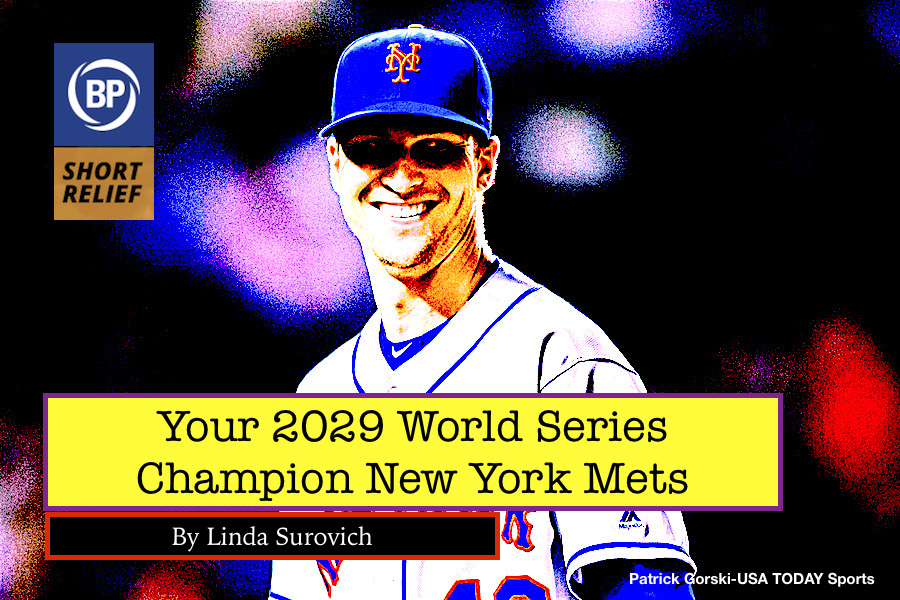
New owner Steve Cohen ushered in the Soaring Twenties for the New York Mets. After decades in the doldrums under the previous ownership, Mets fans could hardly believe their eyes when Cohen brought about a new era of prosperity and a championship to close out the decade. This was their third in ten years, outpacing their crosstown rivals whose World Series drought continues.
One of Cohen’s first big moves was signing Pete Alonso to a 10-year $400 million contract, and the team has been rewarded handsomely for the commitment. Even in his age 34 season, Alonso was among the league leaders in home runs with 72, and hit 10 in the postseason to help lead the team to victory. In Game 7 over Houston he went 4-4 with four home runs and 10 RBI. With ground balls rendered obsolete, none of the seven defenders in the outfield could corral any of the bombs over their heads at Citi Field. Commissioner Rob Manfred assured fans that there is still nothing significantly different about the baseball but the Home Run Committee is “looking into the matter.”
Manfred also issued a “no comment” when asked if it was suspicious that a brass band trumpeted loudly in Houston every time a Mets pitcher threw a breaking pitch. It’s been a tough decade for the embattled commissioner whose initiatives have been widely panned throughout baseball. One of his stranger ideas while muttering “pace of play” to himself was having a runner start at third base instead of first. His argument was that runs will score faster if a runner starts at third, but confusion reigned, and the best baseball minds in the game argued that no time is saved since runners are just now moving around the bases in the opposite direction and the distance remains the same. Pace of play came up again in the NLCS against San Diego when Alonso hit a ball that literally exploded and the robot umpires were unequipped with how to make a ruling. The game was delayed for 45 minutes when Windows 15 did a software update and they could not shut down or restart the robot.
Game 7 of the World Series however was played without incident in front of the typical raucous crowd in Queens. The fans rose to a fever pitch early when the beloved and recently-retired Jacob deGrom was on hand to throw out the first pitch. deGrom of course cemented his place in Mets history by tying Tom Seaver as a three-time Cy Young winner, but he also changed baseball forever when they finally decided to kill the win as an official statistic.
Of course, pitchers are now measured by “groms” when the lack of run support for the former-ace reached a ridiculous level. A “grom” is pitching seven innings and giving up two or fewer runs, and it is awarded to the pitcher regardless of the outcome of the game.
The Mets, having finally built around starting pitching, had the edge the entire World Series. They jumped out to an early lead with Alonso’s first inning home run and never looked back. Citi channeled old Shea, where it seemed at one point the whole stadium was shaking and possibly in danger of collapse. Starter Matthew Allan was stellar against a formidable Houston lineup that did not have the benefit of the trumpet section that it does at home.
Despite all the changes to the game in the last decade, and despite the commissioner trying to kill it with a death by a thousand papercuts, baseball remains ever resilient as evidenced by one of the most comical franchises turning into a powerhouse. Baseball can surprise, it can frustrate, it can be beautiful and perfect, but above all it remains undefeated.
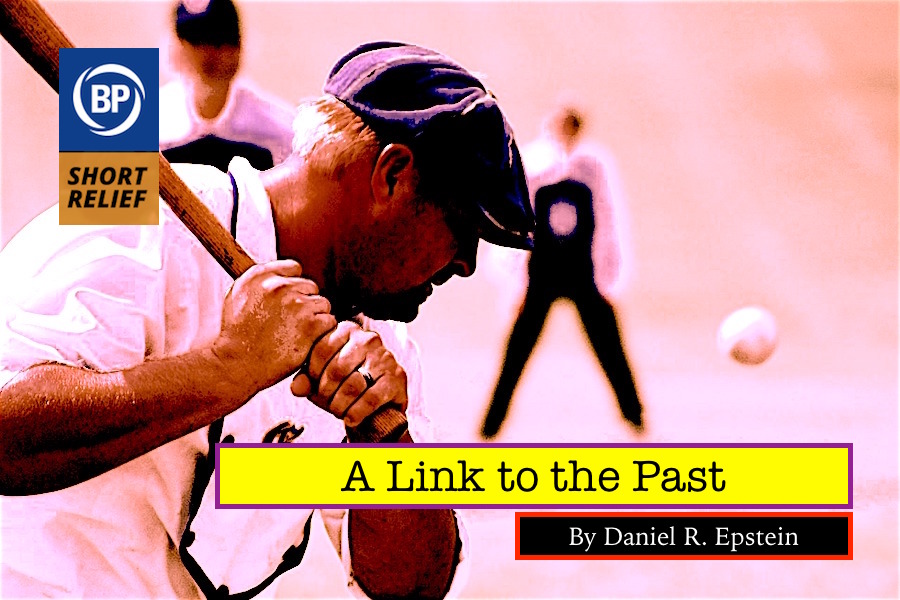
I’m terrible at predictions. I can’t predict what I’m going to eat for lunch in ten minutes, which is a decision I control completely. Predicting a baseball game in ten years is way out of my range. I’d love to make some clever remark about the Montreal Rays or Las Vegas A’s. I could make a halfhearted joke about how the risen sea levels have turned Coors Field into a pitcher’s park, or how Andrew McCutchen, Jr. looks like the next Wander Franco.
That’s not my style. I believe the best predictor of the future is the past. As such, I have developed an accuracy-guaranteed prediction based on the premise of, “If it happened before, it will happen again.”
Here is my recap of the final game of the 2029 World Series, using bits from the last 12 decades’ final World Series games:
After a devastating earthquake delayed the end of the series, a whopping 17,592 fans crammed into Detroit’s Bennett Park for this thrilling matchup. Athletics manager Connie Mack was forced to yank White Sox ace Lefty Williams after only one third of an inning, under Arnold Rothstein’s watchful glare. Bill Dickey, Joe DiMaggio, Jim Leyritz, and Hideki Matsui all homered for the Yankees, despite the best efforts of Jackie, Brooks, Frank, Bill, and Don Robinson (not to mention Canó). Chicago’s Early Wynn left, uh, early after surrendering five runs. The Nationals’ Adam Eaton swiped a base off of- you guess it- yet another Robinson (Chirinos).
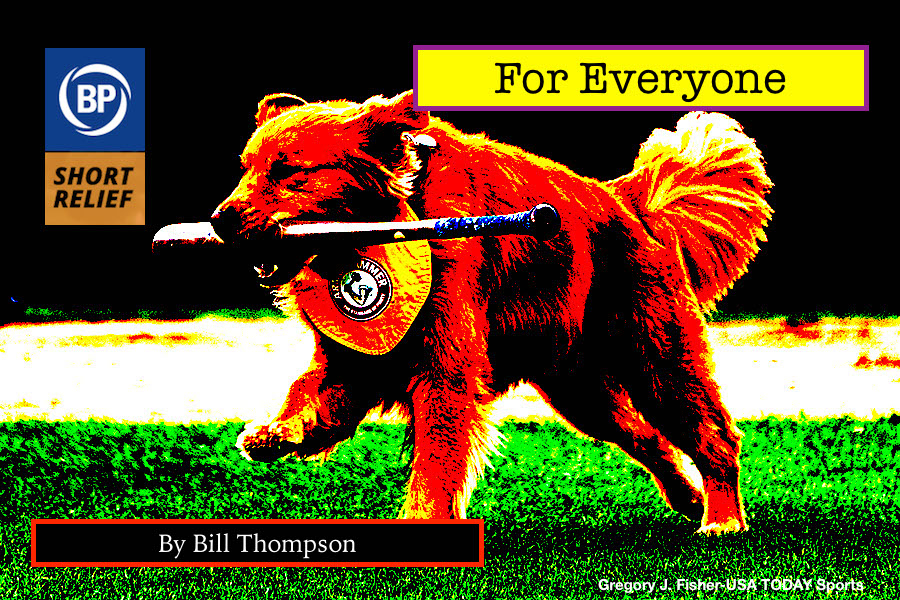
The dreamer in me would love to write some utopian scenario for the last game of the 2029 Major League Baseball season. The kid in me who grew up with MLB and has come to love the entirety of the global game of professional baseball wants to write about a game between the Chicago Cubs and the Hokkaido Nippon-Ham Fighters that came about because MLB finally realized they are not the only league that matters. That’s what optimistic Bill wants to write, but that’s not what pragmatic Bill envisions happening.
That doesn’t mean that I’m about to be a negative Ned or anything like that. I’m hopeful, more than anything, that the upcoming lockout will have some positive effects. I want to see MLB overcome the problems that are making current-day MLB so hard to watch. I also want to see a league where some changes have taken place because they grew naturally out of experimentation and are for the legitimate betterment of play. These positives can happen you know, and I know they can happen. It is my deepest desire for MLB and their powers that be to do everything in their power to, at the very least, implement some changes and find labor peace.
To that end, the best possible scenario I can hope for in the final game of the 2029 MLB season is one in which both teams built winners through the tried and true method of drafting well, trading when necessary, and upholding their public contract to attempt to win at all times. Of course, I want it to be a Game Seven. I don’t care how down on MLB I may be — a Game Seven is always welcome. Hopefully, we will get to see great pitching, and hitting, but also more of the speed that has gone missing from the game. A player with multiple steals in the deciding game, maybe even a player getting a steal of first base. Oh, how I want to see that speed back in the MLB game.
It would also be absolutely joyous is by 2029 either of the two teams playing in the final game has a woman on the team, a minority owner/front office executive, or multiple minority/women coaches. Baseball is a game for everyone, not just one gender or race/ethnicity. I sincerely hope that by 2029 MLB has fully embraced the diversity of our culture and there are openly gay players, transgender athletes, and more. An inclusive MLB is an MLB I would wholeheartedly support and nothing would make me happier than a 2029 World Series game 7 that incorporates that naturally.
Last, but definitely not least, I want damn bat dogs in MLB proper by next year, but definitely by 2029. If we haven’t progressed to the majority of the league having bat dogs (is it too much for me to want the league to have already embraced bat cats as well by that time?) by 2029, then why does MLB even exist at that point?
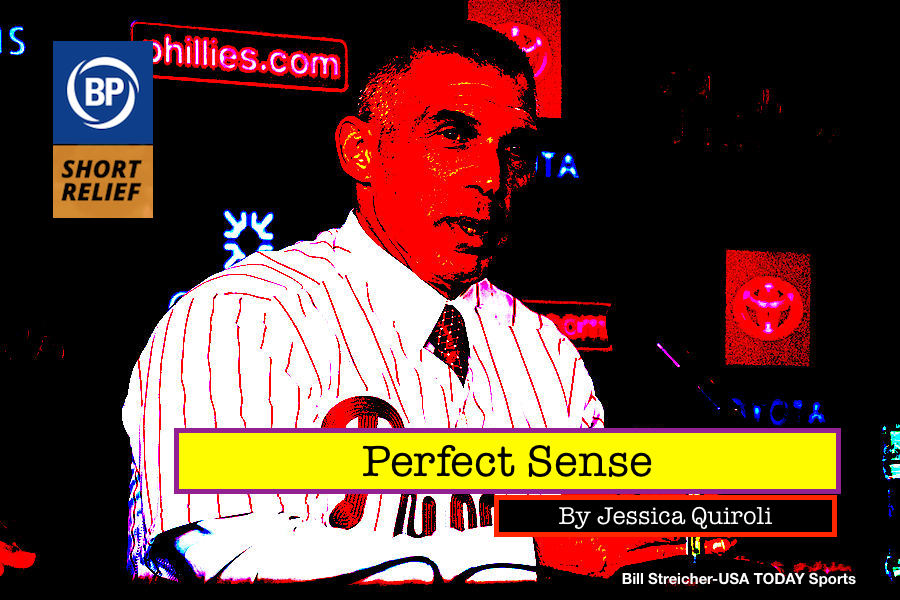
The 2029 World Series: Game Seven. Angels vs Phillies.
Joe had certainly never seen anything quite like this team. No one had.
These guys, they were castaways. Most of them had developed in a broken system that had been rigged against them, and, just ten years earlier, 42 teams were gutted. No one knew what would happen to professional baseball.
Most of the Phillies infield, managed by longtime manager Joe Girardi, who was toying with retirement, had played independent league baseball. So had one of the outfielders and one of the backup catchers, who’d played more games than anticipated due to injuries. Others had survived in the bus leagues, when there were fewer spots after 2021. It had been excruciatingly hard before that. But the competition got wilder, edgier. Bonds had to be tighter because the fight was uglier. No one wanted to hate each other.
Many of them standing on that field in the final game of the baseball season had played together in the Atlantic League, a few years after the league’s partnership with MLB to use the AL as a testing ground for changes they was considering. There were more eyes on them, then came more fans, and more investors.
They had come this far with the Phillies’ unofficial, but clear team leader Bryce Harper. The series had even more emotional punch and tension because he was playing in a World Series against beloved Philly area native and Eagles superfan Mike Trout, who didn’t seem interested in returning “home” years earlier as fans had hoped. These were the teams that they were going to retire with, go into the Hall of Fame with. This fight was a team effort. But a longtime investment of hope rested on those two players, and they knew it.
Baseball has always gotten stamped with a time of death, only to rise and reform. It had it’s way of surviving. And Philly, that put upon workhorse, needed another sports title. Needed to feel baseball in their veins again. All the changes, like iPads in the dugout, didn’t change the essence of baseball. Modern baseball remained romantic, even with a robotic strike zone that was strangely not out of place a decade later. Umpires and human error weren’t a thing of the past, More technology was simply helpful.
What had been a devastating, baffling blow to baseball, was now, ten years later an embodiment of the resilience of the game to reshape into something new, but remain fundamentally the same. At least in our unchangeable hearts.
Harper. Trout. Indy league scrappers, minor leaguers with less chances to create opportunity. They were here in the last dance. It was a World Series Game that made no sense. But, if you knew baseball well enough, it made perfect sense.
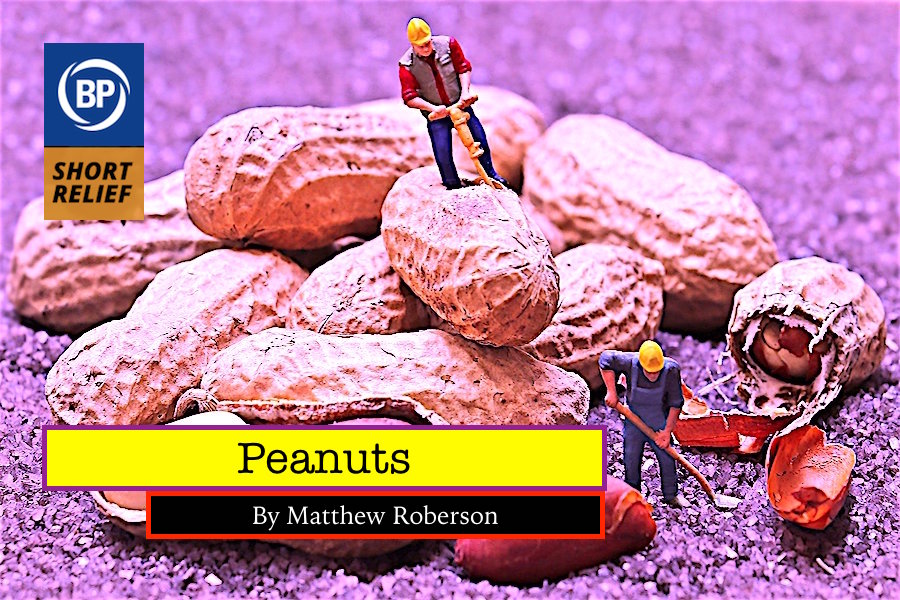
The Dodgers are making their ninth World Series appearance in the last 13 years, still searching for their first title. Their opponent, the Portland Peanuts, charge into the Fall Classic under the direction of manager Scott Brosius. Russell Wilson hung up his football helmet to bat .213/.298/.402 for this band of overachievers. The Peanuts are made up entirely of players they traded for or signed in free agency because Rob Manfred wouldn’t let them have a minor league system.
As for the actual game, it still cannot escape Manfred’s ire. Pace of play remains a disaster as fans passively complain about the overcast conditions in Portland. In the second inning of the decisive Game 7, the robo ump glitches and the game is delayed while Joe Torre tries to talk through the problem with an IT person 70 years his junior. In the fifth inning, the game is delayed again as color commentator John Smoltz storms onto the field to argue with the robo ump, showing an admirable ability to both hate things and not understand how they work. Fox Sports signs him to a 13-year extension.
The Dodgers lose another heartbreaker, coughing up a three-run lead in the bottom of the eighth. This time, as Los Angeles bats in the top of the inning with two outs and runners on the corners, a previously-estranged Seager brother lifts a pop up into foul territory. While the ball descends into their section, a Portland fan spills their latte and burns a hole through the protective netting. This allows the Peanuts’ right fielder to make the play on a ball that would have been uncatchable with the net fully intact. 46-year-old David Freese wins the game with a grand slam in the home half of the inning, and three hours after the game Portland trades their six best players for financial flexibility.
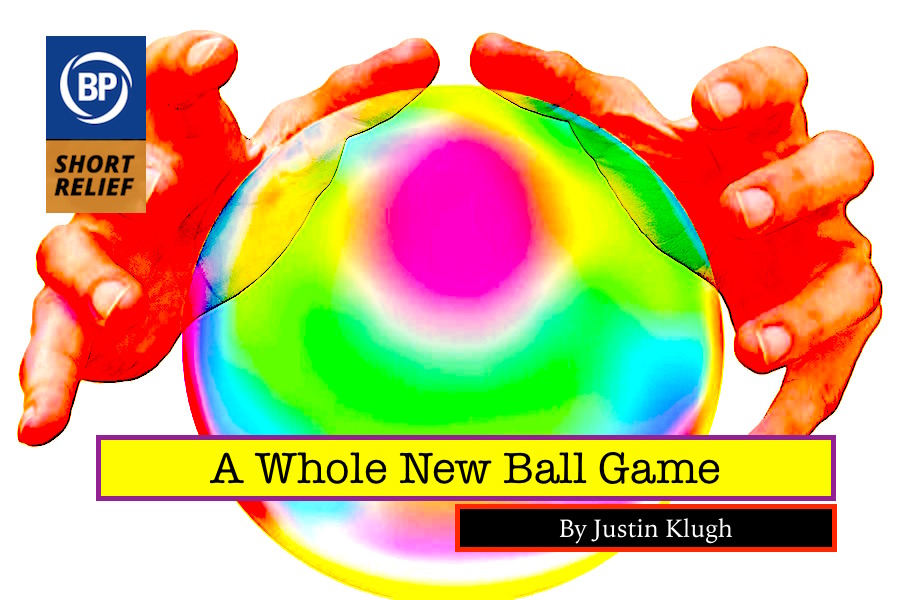
After much debate over what a baseball is, how it is constructed, how far it should go when struck, and what rare elements should make up its center, the league has determined that the best course of action is to convert the baseball into a being of pure energy.
In its first game under the new rules, the ball is fouled off into the stands, where a grown man in a backwards cap boxes out a couple of kids to snare it. Upon coming in contact with the orb, he becomes translucent, his screams heard as though echoes from worlds away. He blinks in and out of existence a few times before being incinerated into unfiltered nothingness.
And so, baseball enters the Pure Energy Era, in which the sport becomes less about making contact or adjusting to the shift, and more about living in fear of who the ball will select to be a feast for the universe.
WHO DARES TO STAND BEFORE ME, it calls.
A weeping lead-off hitter raises a quivering hand.
APPROACH.
He says his farewells to his teammates and uselessly places a helmet on his head. It makes no difference. The ball can sense his thoughts and see his entire life. It knows that he had intended to work in an air filter factory, as his father had before him, before being selected at random by the governing bodies of his sector to die for our entertainment. The average career in professional baseball has gone from eight to ten years to 20-30 minutes.
YOU STAND THERE, the ball says, a cluster of blue light hovering over the pitching mound. There is no defense. I WILL HURL MYSELF TOWARD YOU AND YOU SHALL ATTEMPT TO DEFEAT ME.
Armed with only the traditional wooden club, the batter walks up to the chalk white line around home plate, hesitating to take the final step. He knows what awaits him once he steps into that box.
High above, in a box suite insulated by 12 inches of airtight glass, sits The Commissioner in a wrinkled suit and tie, his hair disheveled, his breath stale. Next to him are several other balls of pure energy wearing ball caps and waving pennants. They have broken off from the original ball and now gather to watch their genderless parent send humans into the void. The Commissioner is not restrained or guarded, but still has the sense that he is not allowed to leave. He regrets bringing about this situation; the studies and funding channeled into creating The Baseball of the Future, a ball the 2030s deserved.
But how was he to know that he would be enslaving the sport to an endless death? The repeated warnings from top scientists? The cryptic, handwritten messages slipped under his door saying he is “meddling in affairs he could not comprehend?” The pleading of his children not to bring about a world in which the crack of the bat became the wail of the damned?
He nods to himself now, understanding that yes, those were all things to which he should have paid attention. But he’d been distracted by the owners’ demands that they be allowed to sell their players to the Military Industrial Complex; when the minor leagues had been abandoned and, unchecked, descended immediately into tribal warfare; when the government had finally kicked down their door and demanded access to the technology behind hot dog cannons to create a meat-throwing super weapon. Despite these problems, developing The Baseball of the Future would bring people back to the game. He’d been so sure.
YOU ARE NOT PAYING ATTENTION, one of the beings accuses him. BASEBALL IS ALL ABOUT STRATEGY. IN FACT, IT IS MORE ABOUT WHAT YOU DON’T DO THAN WHAT YOU DO DO.
“Oh I am; I am,” The Commissioner replies. “Who’s batting?”
RAMIREZ. PECOTA IS PROJECTING HIM TO MAKE AN IMPACT THIS YEAR BATTING FROM THE LEFT SIDE, BUT ACCORDING TO MY BACK-OF-THE-NAPKIN CALCULATIONS, HE WILL, the orb glances down at a scrap of paper, DIE SCREAMING.
And indeed Ramirez does, the thick glass not quite entirely muffling it.
MMMM, one of the pure energy beings says. THINK THEY’LL REVIEW THAT ONE?
LET US RETURN TO OUR HOME IN THE CLOUDS TO DISCUSS THE GAME AD NAUSEUM, one of them suggests. I’D LIKE TO EXAMINE HOW THE MASTER BALL APPROACHES RIGHT-HANDED HITTERS.
IT IS ONLY THE SIXTH INNING.
I’M NOT GETTING STUCK IN TRAFFIC AGAIN. C’MON.
Several horrible deaths and/or maimings later, the 2029 World Series comes to its conclusion. The Commissioner watches as the orbs soared into the sky, where each year, they wait patiently to return the following spring. It was clear now: The game had changed, and not necessarily for the better. He has time now, he knows, to fix it. To make it recognizable to the masses who grew up watching it while appealing to the next generation. To formulate new ideas and activate outreach to stir interest. To make adjustments to archaic rules and ensure that everyone is compensated fairly. To maintain labor peace between the players and the owners.
Lost in thought, he wanders down to the locker room and decides to go in to shake a few hands. It is the least he can do after another long season. A grim silence hangs in the air as players avoid eye contact, hurrying to pack and leave should their executioners return. What better place, The Commissioner thinks, to brainstorm a few ideas about improving the sport.
From the trainer’s room, a scream is heard as a man with half a face is placed into a medically-induced coma.
“Maybe if the offense starts with a runner on second,” he muses.
Thank you for reading
This is a free article. If you enjoyed it, consider subscribing to Baseball Prospectus. Subscriptions support ongoing public baseball research and analysis in an increasingly proprietary environment.
Subscribe now